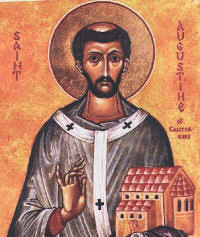HOMILY WEEK 08 04 – Year I
The Healing of Bartimaeus: Faith, Healing and Following Jesus
Optional Memorial of Saint Augustine of Canterbury
(Sirach 42:15-25; Ps 33; Mk 10:46-52)
******************************************************
“Many sternly ordered him to be quiet, but he cried out even more loudly, ‘Son of David, have mercy on me!’”
The gospel today invites to have the profound faith of Bartimaeus in Jesus as the Messiah, come to him for healing, take up our cross and follow him.
There is a distressing note in the gospel, in that the crowd around Jesus that day actually tried to prevent poor, blind Bartimaeus from catching the attention of Jesus. Before being too harsh on them, however, it would be good for us to check out own behaviours and attitudes. Are there times when we perhaps unintentionally did very much the same thing – discouraged others in their journey to greater faith by our negative attitudes or discouraging comments. Thankfully, when Jesus stopped and told them to call the man, they obeyed, shifted their stance and encouraged him to get up and go to Jesus.
The cloak for Bartimaeus was his only status, his permission to beg. He throws it away before Jesus heals him, in faith. What a contrast to those who were discouraging him, and what an example for us. We must also let go of old securities and embrace the new, the unimaginable.
This story is similar to the healing of the blind man of Bethsaida (8:22-26). Mark uses these two stories of new sight to frame the whole section (8:22-10:52) dealing with Jesus’ predictions of the passion and the disciples’ misunderstanding. Eyes must be opened – both the disciples’ and ours – to see the true meaning of Jesus’ messianic suffering and so correctly follow him on this new way to life with God.
This is a transition passage, preparing for the revealing of the humble Messiah and the true nature of his messiahship in Jerusalem. So now there is no need for secrecy – when Jesus is acclaimed as Son of David he calls the man to him, heals him and allows him to follow. In addressing Jesus that way, Bartimaeus was acknowledging Jesus as the Messiah, as the descendant of David who would come to establish an eternal kingdom. Bartimaeus was professing that Jesus was more than a gifted rabbi or a prophet. He was the fulfilment of God’s promises. When Bartimaeus cried out, it was a cry of profound faith in Jesus, anointed by God, the one who could heal and restore him: Jesus, Son of David.
This miracle of sight is meant to heal his disciples, and us, of our blindness. It takes faith to recognize the mercy and compassion of the Son of David and follow him in the way of humble discipleship. The emphasis on suffering ever since Caeserea Phillipi rules out any triumphalism.
Since Mark wants to show that only Jesus is the model of a true disciple, he presents a negative image of the disciples. Mark stresses that a Christian disciple is one who can take up his or her cross and follow Jesus on this way of suffering. Any other claim to discipleship – from family ties, being one of the twelve apostles, having a personal knowledge of Jesus or simply belonging to a religious community or tradition, will always end in failure. Jesus offers no quick fix or easy comfort. The only solution is to take up one’s cross as Jesus did, for only by living through the suffering and death does resurrection follow. Suffering is not the end but the door to a new existence with God, who never abandons us.
This passage speaks to our human tendency to want sensational things from God, to get something out of God, rather than simply do God’s will, humbly worship and love one another.
 Today, the church invites us to honor St. Augustine of Canterbury, who managed to balance action and contemplation in his life and ministry. In 596, Pope Gregory the Great sent Augustine, prior of St. Andrew’s monastery in Rome, and about 40 monks to evangelize England. The group was well received by King Ethelbert of Kent, who later became a saint himself. Augustine was soon made bishop and instructed to develop a hierarchy for England and to substitute Christian feasts for pagan celebrations. Apart from the Welsh refusal to accept either Augustine or the Roman traditions he proposed, the mission was successful. Augustine established a Benedictine monastery at Canterbury. The first archbishop of Canterbury, this “Apostle of the English” continued to work for the faith in Britain until his death in 604.
Today, the church invites us to honor St. Augustine of Canterbury, who managed to balance action and contemplation in his life and ministry. In 596, Pope Gregory the Great sent Augustine, prior of St. Andrew’s monastery in Rome, and about 40 monks to evangelize England. The group was well received by King Ethelbert of Kent, who later became a saint himself. Augustine was soon made bishop and instructed to develop a hierarchy for England and to substitute Christian feasts for pagan celebrations. Apart from the Welsh refusal to accept either Augustine or the Roman traditions he proposed, the mission was successful. Augustine established a Benedictine monastery at Canterbury. The first archbishop of Canterbury, this “Apostle of the English” continued to work for the faith in Britain until his death in 604.
The Eucharist is a profound act of faith, as we encounter Jesus, present here in his Word and in the Bread and Wine. So, let us have faith in Jesus, throw off our old securities, take up our cross and follow Jesus.



